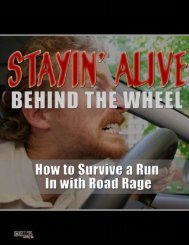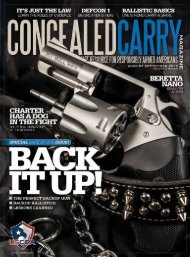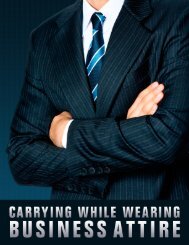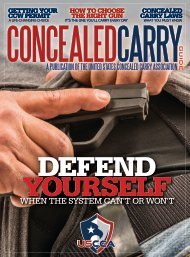Download This Issue - US Concealed Carry
Download This Issue - US Concealed Carry
Download This Issue - US Concealed Carry
You also want an ePaper? Increase the reach of your titles
YUMPU automatically turns print PDFs into web optimized ePapers that Google loves.
POINT-COUNTERPOINT<br />
PHOTO BY OLEG VOLK • A-HUMAN-RIGHT.COM<br />
Unravel<br />
Post S<br />
[ B Y A R T M I Z E ]<br />
The whole idea of some sort<br />
of psychological hangover<br />
resulting from close<br />
encounters of the firearms<br />
kind is not new.<br />
The stories of the effects of war on<br />
combat veterans in American history<br />
go back at least to the Civil<br />
War. In World War I, the term shell shock<br />
was used to describe the symptoms of<br />
those severely affected by combat, even<br />
though they might have been nowhere<br />
near a bursting shell, as the name implies.<br />
Severely impacted vets from World<br />
War II were diagnosed as having combat<br />
fatigue by compassionate folks who<br />
were in charge of organizing treatment<br />
for warriors who carried debilitating<br />
mental wounds home from the conflict.<br />
There were significant limitations in the<br />
shrink community’s understanding of<br />
how strong, otherwise healthy young<br />
warriors were being mentally wounded<br />
in the wars they fought, and even less<br />
understanding about how they might<br />
be healed. That courage and valor were<br />
no shield against the effects of a long<br />
and bloody conflict are evidenced by<br />
the fact that our most decorated soldier,<br />
Audie Murphy, suffered from debilitating<br />
depression, insomnia and addiction<br />
to sleeping pills, problems which<br />
36<br />
CONCEALED CARRY MAGAZINE n JULY 2008
















